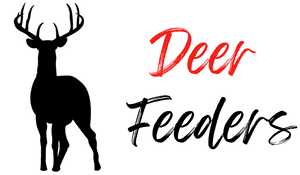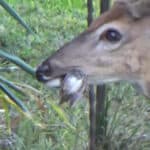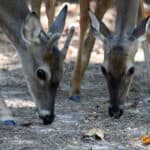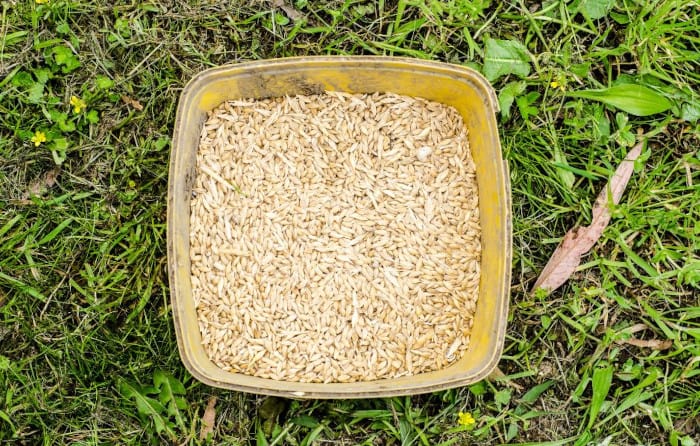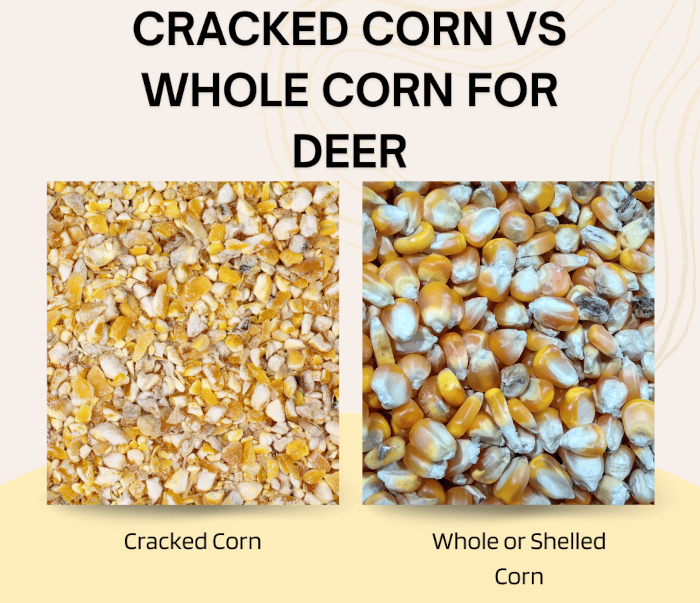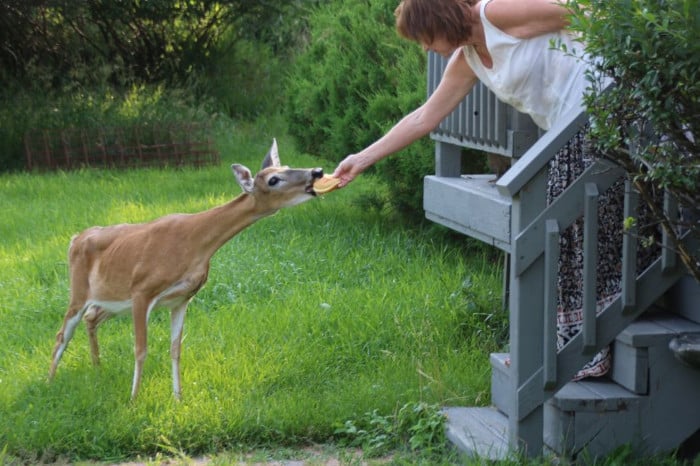At my day job, I’m asked all kinds of different questions about what to feed deer and the possibility of them eating food sources that are not a normal part of a deer’s diet. One topic that comes to mind involves deer and dog food. The question that I’m usually asked about pet food and deer is this: do deer eat dog food?
This question is typically geared towards wildlife enthusiasts who are likely feeding whitetail deer in their backyard. It’s not a commonly asked question among deer hunters.
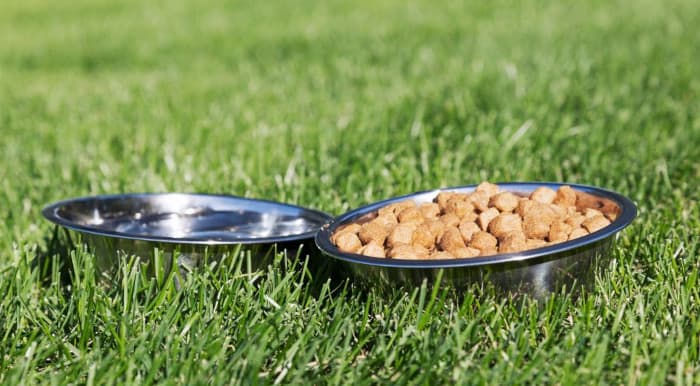
In this article, I’ll look at the feasibility of deer eating dog food and any potential deer health issues associated with consuming pet food.
First, let’s look at the deer’s typical food sources.
What Do Deer Eat?
Deer are herbivores, which means they feed on plants. Their diet varies depending on the season, region, and food availability. Here are some of the common foods that deer eat:
Leaves and Twigs
Deer feed on leaves and twigs of various trees and shrubs. Some of their favorite trees include maple, oak, and birch. They also eat twigs and shrubs such as dogwood, sumac, and blackberry branches.
Fruits and Berries
Deer love fruits and berries, especially during the fall and winter when other food sources are scarce. Some of the fruits and berries they eat include apples, blueberries, raspberries, and grapes.
Grasses and Forbs
During the spring and summer, deer feed on grasses and forbs. They graze on grasses like fescue, ryegrass, and bluegrass. They also eat forbs, which are non-woody plants that grow in fields and meadows.
Acorns and Nuts
Deer feed on acorns and nuts during the fall when they are abundant. They eat nuts from trees such as hickory, walnut, and pecan. They also eat acorns from oak trees.
Agricultural Crops
Deer are also known to feed on agricultural crops such as soybeans, corn, and wheat. However, this can cause damage to crops and is a common problem for farmers.
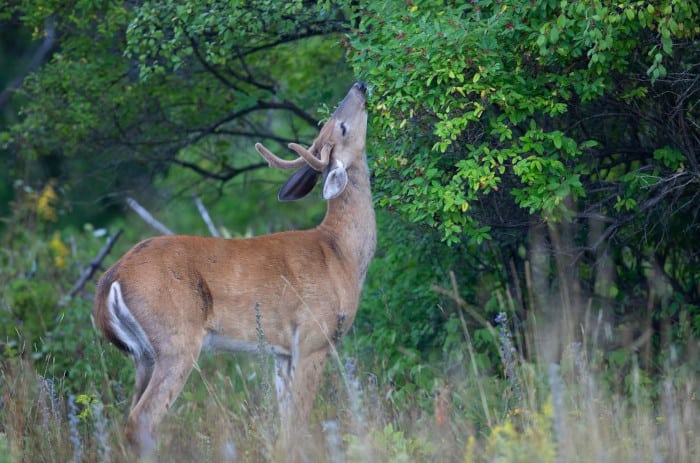
A Dog’s Typical Food Sources
Deer and dogs have vastly different diets because deer are herbivores, while dogs are omnivores. Herbivores rely solely on plants for their nutritional needs, while omnivores consume both plant and animal-based foods.
In contrast to deer’s omnivore-based diet, most dogs require a balanced diet consisting of protein from meat sources (such as chicken or beef), carbohydrates from grains (such as rice or oats), fats for energy (such as fish oil), vitamins and minerals for overall health (such as vitamin C or calcium).
Will Deer Eat Dry Dog Food?
Can deer eat dog food? Will deer eat dog food? The short answer is yes to both questions. If you leave wet dog food or dry dog food outside, and a deer comes across it, there’s a possibility that they will consume it. This is especially true if the deer have trouble finding natural food sources, or food is scarce.
Whitetail deer can eat dog food, and will indulge in both wet and dry versions. However, deer consuming pet food seems to be more of an opportunistic situation when they are having trouble finding natural food.
Given the choice between a food supply like deer corn, or soybeans versus pet foods, whitetail deer seem to prefer agricultural food options over any type of pet food.
However, just because deer will occasionally consume pet food doesn’t mean that dog food is a healthy dietary item.
Potential Cons of Feeding Deer Dog Food
Feeding deer pet food is not without some potential risks, including the following:
Dog Food Products Are Not Part of a Typical Deer Diet
A whitetail’s natural diet doesn’t include any canine cuisine, so it’s not something they’re used to eating, and it’s not a wild deer source of food.
Pet food contains ingredients like chicken meal, corn byproducts, fish byproducts, along with sodium and chloride. Most of these ingredients are not something deer eat in the wild, and some of those ingredients may be difficult for a deer to digest. Plus, most pet foods have added vitamins and minerals, which can disrupt a deer’s natural dietary balance.
Artificial Preservatives in Dog Food Can Be Harmful to Wild Deer
Feeding wild deer dog food may seem like a kind gesture, but it can actually be harmful to their health. One of the main concerns with providing deer dog food is the presence of artificial preservatives. These preservatives are added to dog food to extend its shelf life and prevent spoilage, but they can negatively affect wildlife that consume them.
Some common artificial preservatives found in dog food include BHA (butylated hydroxyanisole), BHT (butylated hydroxytoluene), and ethoxyquin. Studies have shown that these preservatives can cause liver and kidney damage in animals, as well as increase the risk of cancer. While these risks may not be immediately apparent, they can have serious consequences for wild deer populations over time.
Enterotoxemia and Acidosis
In addition to the concerns already noted, feeding deer dog food can also lead to conditions called enterotoxemia and acidosis. Enterotoxemia is a condition caused by toxins produced by bacteria in the gut. When deer consume high levels of carbohydrates found in dog food, it can disrupt their gut flora and lead to an overgrowth of harmful bacteria. This can result in severe health problems such as diarrhea, dehydration, lethargy, seizures, and even death within weeks.
Acidosis is another issue that can arise from feeding deer dog food. It occurs when there is an excessive buildup of lactic acid in the bloodstream due to carbohydrate overload. This condition causes a drop in pH levels which can lead to metabolic imbalances and organ failure if left untreated.

Leaving Dog Food Out for Deer May Attract Other Unwanted Animal Visitors
Setting out dog food can also attract other predators like coyotes, foxes, or bears who are looking for an easy meal. Even mountain lions have been known to eat pet food when natural prey is scarce.
This situation creates safety risks not only for humans but also for the animals themselves. When predators begin congregating in areas where people live, it increases the likelihood of conflicts between humans and wildlife.
This is especially true with coyotes, as they will go after any domestic dog or cat that they can overpower.
Pet Food Offers Little Nutritional Value for Deer
Another issue with feeding wild deer dog food is that it may not provide them with all the necessary nutrients required to survive. Dog food is formulated specifically for dogs and contains a different balance of nutrients than what wild deer would naturally consume.
For example, many types of dog food are high in protein and fat, which can be beneficial for dogs but may not be ideal for wild deer. In the wild, deer typically consume a diet that is higher in fiber and lower in fat. This difference in nutritional needs could lead to health problems for deer that are fed dog food over an extended period of time.
Dog Food is Heavy with Meat Proteins
Since dogs are carnivores, meat is a large part of their typical diet. For this reason, most dog foods are loaded with various forms of meat proteins.
Although deer do not require meat in their diet, they may occasionally eat small animals like rodents or birds for additional protein. However, this is not a significant part of their diet as they can get all the necessary nutrients from plant sources.
It is essential to note that feeding deer with meat protein or other unnatural sources of food can potentially lead to digestive problems and health issues.
Alternative Foods for Deer
If you are interested in feeding your local deer population, several foods are healthier and offer better nutritional value than pet foods.
The following foods are a better food options for deer than commercially produced pet foods:
Deer Corn
Corn is a popular option for feeding deer, as it is cheap and readily available. It is also high in carbohydrates, providing deer with the energy they need to survive during harsh winters. However, it is important to note that corn should not be the only food item provided to deer, as it lacks essential nutrients found in other plants.
When feeding corn to deer, it is best to do so in moderation. Overfeeding can lead to digestive issues and health problems such as acidosis. Providing too much corn can cause deer to become dependent on humans as a source of food, altering their natural behavior.
Oats
Oats are another inexpensive option for feeding deer. They are high in fiber and protein, making them a nutritious addition to a deer’s diet. Oats also contain essential vitamins and minerals that can help keep deer healthy.
When feeding oats to deer, it is vital to ensure they are not processed or flavored with sugar or other additives. Plain rolled oats or steel-cut oats are the best options for providing a nutritious meal for these animals.
Barley
Barley is an affordable alternative to corn and oats when feeding deer. It contains similar levels of carbohydrates and protein as corn but has more fiber than either of the other two options.
Wheat
Wheat is another low-cost choice when feeding deer. It contains similar levels of carbohydrates and protein as corn but has more fiber than oats, barley, and soybeans.
Soybeans
Soybeans are another high-protein option for feeding deer. They contain essential amino acids that can help keep these animals healthy and strong. Soybeans also contain fiber, carbohydrates, and essential vitamins and minerals.
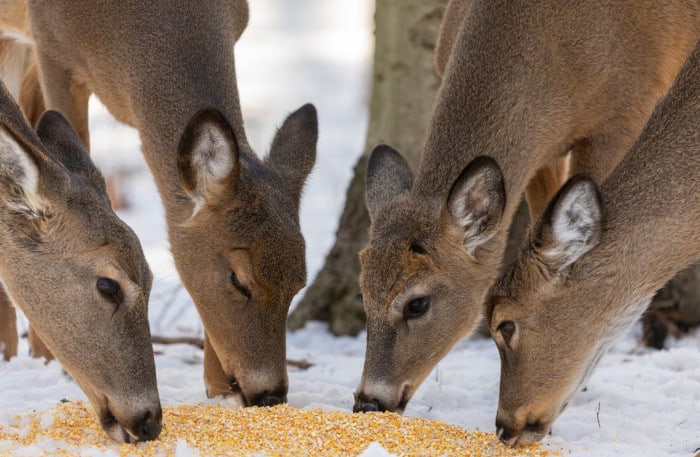
Should You Feed Whitetail Deer Dog Food?
Although a small amount of dog food won’t hurt deer, it’s best to resist the urge and stick with better-quality food items.
It’s essential to remember that wild animals should remain wild and not become dependent on human-provided food supply.
If you want to keep deer in your local area, there are alternative ways to do so without feeding them dog food. For example, planting native vegetation or providing a salt lick can help attract them while still allowing them to maintain a healthy deer diet.
If you find yourself with an abundance of dog food left over after feeding your pooch, it’s best not to leave it out where wildlife can access it. Instead, donate any leftover dog food to local pet shelters or rescue organizations.
Frequently Asked Questions
Here are some common questions that I see associated with deer eating dog food:
Do deer prefer wet or dry dog food?
Honestly, neither is a good option because pet food is unnatural and not part of the deer’s natural diet. If you want to feed the deer in your backyard, there are much better food options than pet food.
Can deer eat dry dog food?
A small amount of dry dog won’t hurt deer, but any dog food (dry or wet) is not a recommended food item for deer due to the potential health issues it can cause over time. In addition to the potential health complications, dog food contains very little nutritional value for deer.
Is it ethical to feed deer dog food?
Feeding deer any type of non-natural food, including dog food, has always been a controversial subject, with many biologists claiming it’s potentially unhealthy for deer.
From an ethical perspective, the practice of offering deer dog food is iffy at best. Whitetail deer are herbivores, while dogs are omnivorous, meaning their diets differ significantly. Dogs require more protein than what is found in most commercial dog foods, and deer do not have the digestive system to digest the ingredients found in these products properly.
Additionally, some argue that, since deer are wild animals, providing them a constant food supply could potentially disrupt natural foraging behaviors, leading them away from native plant species that provide essential nutrients.
If you feel the need to feed your local deer, consider offering them a food item that is potentially found in their natural habitat.
What should I do if I find deer eating my dog’s food?
If you encounter a situation where you find deer eating your dog’s food, I’d do the following:
- Try to scare them away to keep them from consuming any more food.
- Take measures to isolate the pet food so that deer cannot access it.
What is the cheapest thing to feed deer?
From a low-cost perspective, deer corn is likely the least expensive supplemental source of food for deer. While it’s not the healthiest food item for whitetails, it tends to be the least costly, especially if you purchase it in bulk quantities.
Final Thoughts
The general consensus among deer biologists indicates that dog food is not a good deer food item.
So, if you want to help out your local wildlife population, keep your dog’s kibble away from any passing deer – they’ll thank you for it.
